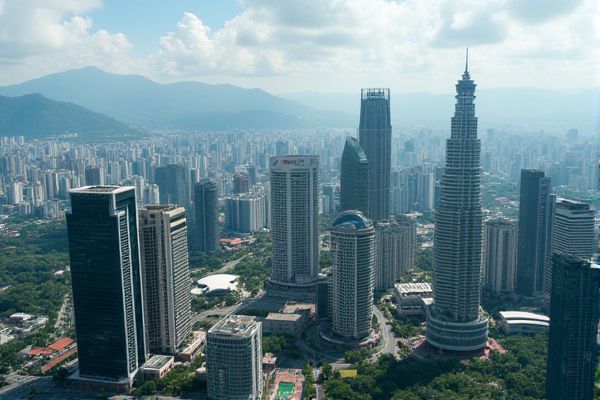
Healthcare facilities in Malaysia: Public and private healthcare options available. Hospitals are JCI accredited. English-speaking medical staff. Affordable medical services. Advanced medical technology. Health insurance highly recommended. Clinics located in urban areas. Mandatory national health coverage. Specialists require referrals. Emergency services widely accessible.
Public and private healthcare options available.
Malaysia's healthcare system operates on a two-tier structure, with a public universal healthcare system funded by general taxation that offers affordable and comprehensive services. However, it often encounters challenges such as extended wait times and shortages in personnel and equipment. The private healthcare sector, primarily found in urban areas, provides more immediate access, superior facilities, and higher staff-to-patient ratios. This comes at a higher cost, prompting many residents to supplement their coverage with private health insurance. To learn more about the intricacies and developments of this system, you may visit the Healthcare In Malaysia page. Overall, while both sectors cater to different needs, the balance they strike is fundamental to the nation's health services.
Hospitals are JCI accredited.
In Malaysia, there are several hospitals that hold the prestigious JCI accreditation, such as Gleneagles Intan Medical Centre, IJN - National Heart Institute, Penang Adventist Hospital, International Specialist Eye Centre, Prince Court Medical Centre, Pantai Hospital Kuala Lumpur, and Sime Darby Medical Centre Subang Jaya. These renowned institutions have successfully met the international standards for quality and patient safety set by Joint Commission International (JCI), ensuring top-notch healthcare services for their patients.
English-speaking medical staff.
In Malaysia, the majority of healthcare professionals in major hospitals speak English fluently, reducing language barriers for visitors and expatriates, although medical forms are typically completed in Bahasa Malaysia. Many doctors in Malaysia have been trained in countries like the UK, Australia, or the US, ensuring they are proficient in English and provide care to Western standards. For more detailed information, you can visit the International Insurance website.
Affordable medical services.
Malaysia's Healthcare System offers highly affordable medical services, with the public healthcare system providing comprehensive care at minimal costs, such as RM1 for outpatient treatment for citizens and free vaccinations for children. Meanwhile, private hospitals also offer affordable and quality care with various insurance options available. For more detailed information, visit the Global Passport website.
Advanced medical technology.
In Malaysia, advanced medical technologies are being utilized extensively, particularly in private healthcare facilities like IHH Healthcare, which offers state-of-the-art diagnostic equipment, targeted radiation therapies, robotic-assisted surgeries, and other cutting-edge treatments that enhance precision, reduce recovery time, and improve patient outcomes.
Health insurance highly recommended.
Health insurance is highly recommended for expats in Malaysia, as the country's subsidized healthcare system is only available to citizens, and expats must either sign up for the Foreign Worker Hospitalization and Surgical Scheme or purchase a private health insurance plan to avoid high out-of-pocket medical expenses. To better understand your options and find a suitable plan, it's beneficial to explore resources like the International Health Insurance in Malaysia guide, which provides comprehensive information on navigating health coverage as an expatriate in Malaysia.
Clinics located in urban areas.
In urban areas of Malaysia, such as Kuala Lumpur, Cyberjaya, and Subang Jaya, there are numerous panel clinics that provide medical screening services for international students, with detailed listings of clinic locations, operating hours, and contact information. These clinics, like Selcare Clinic, KLINIK HARMONI, and KLINIK PRIME CARE, offer a range of medical services including in-house X-ray facilities. For further details on the available clinics, the Education Malaysia website provides comprehensive information to assist students in finding the appropriate service locations.
Mandatory national health coverage.
Malaysia is exploring the introduction of a mandatory national health insurance scheme to improve funding and delivery of public healthcare. Recommendations for this scheme include a gradual implementation, diversified financing options, and targeted subsidies to enhance equity and financial sustainability. For more details on this initiative, you can visit the National Health Insurance System page.
Specialists require referrals.
In Malaysia, specialist care typically requires referrals from primary healthcare clinics, with the Enhanced Primary Healthcare (EnPHC) initiative introducing standardized referral processes. This includes the use of the NCD Care Form and the appointment of liaison officers to manage referrals and ensure feedback between clinics and hospitals. For more detailed information on similar healthcare initiatives, you can refer to Enhanced Primary Healthcare.
Emergency services widely accessible.
In Malaysia, emergency services are widely accessible, thanks to a 'one nation, one number' system utilizing the universal emergency number '999.' The country offers a variety of EMS services, including hospital-based, Civil Defence Department, and private systems. However, accessibility remains a challenge in the remote areas of Sabah and Sarawak. In these regions, initiatives like the 'Flying Doctor Services' and community health volunteers play a crucial role in bridging the gap. To learn more about the complexities and improvements in this field, visit the comprehensive analysis on Prehospital Care in Malaysia, which delves into the issues and challenges faced by the system.
